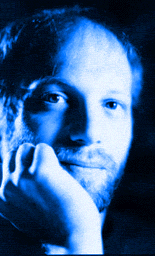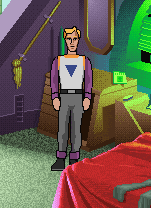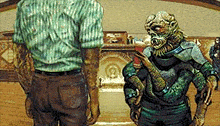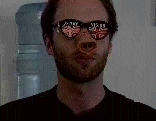
Interview conducted September 2000

 Josh Mandel: Game Designer Extraordinaire |
Josh Mandel: Well, let's see. I spent most of my childhood wanting to be an actor - and I actually have a few bizarre credits in commercials, TV shows, and so on. After college, I spent my life performing comedy around the country with a partner (Karen McVeigh). It was a turning point in my life when Karen and I did a Christmas Party show at Sierra my first year there, and Ken came backstage after the show and said, "You should be designing games for us. You're an entertaining kinda guy."
What strange twists of fate originally brought you into the gaming industry and to Sierra's doorstep?
JM: I was spending big dollars on computer gaming, and decided after a short time that I could make my hobby pay for itself via a combination of beta-testing (which I did for Sierra and Infocom) and journalism - writing game reviews and walkthroughs for magazines. That worked great for several years, and it was through betatesting that Sierra eventually asked me to work for them full-time. Karen and were no longer performing on the road, and I was spending days in advertising. The overwhelming sense of creative vision at SOL and the awesomely beautiful setting were like a one-two punch.
For those readers not familiar with your work, what were some of the games you had a hand in developing?
JM: FREDDY PHARKAS, SPACE QUEST 4 and 6, LEISURE SUIT LARRY 1-VGA, LSL 5, LSL6, PQ1-VGA, PQ3, PQ4, ECOQUEST, LAURA BOW II, JONES IN THE FAST LANE, KING'S QUEST 5, KQ1-SCI, PHANTASMAGORIA, ZELIARD.those are the ones that come right to mind, but there were others. It wasn't unusual for people to work on a lot of projects there, resources were shared heavily, and, like many folks, I enjoyed not being pigeonholed on just one game for the duration of its development.
How did you come to be involved with the Space Quest series? Leslie Balfour once said that she got wrapped up in the series when everyone at Sierra drew straws and she lost.
JM: Leslie was pulling your leg, as she is wont to do. There weren't a lot of comedy writers at Sierra, and she was an active comedy writer both inside and outside of SOL's walls. She's the one who coined the phrase, "In Space, Nobody Can Hear You Clean," which I think is the best tagline Sierra ever had. And she'd done a lot of great work on the SQ Collection, the magazine, lots of projects. In 1993, I think, a good number of Sierra people, myself included, worked on or performed in one of her original musical comedies, HAMLET ON WRY. Tapes available from Leslie upon request.As to my involvement, when I first got to Sierra, I was anxious to be involved creatively (I was initially a producer, which is typically a fundamentally managerial task). I asked every designer with a game in production if I could help by contributing either writing or design; Scott and Mark (among others) took me up on it and set me to writing stuff for SQ4: the Bargain Bin text, the Radio Shock online catalog text, the fake Hintbook text, and look messages for many of the locations on Xenon, Estros, and the Galleria. It was great fun, the Two Guys had such a no-holds-barred attitude, hence the fact that Sierra's lawyer would break out in an icy sweat every time he entered the SQ area.
 Roger hangs out in his quarters in Space Quest 6: The Spinal Frontier |
JM: The design was essentially finished, although we couldn't agree on how to end the damn thing. I was looking for a twist on the end of PLANET OF THE APES (something that would be superior to the SPACEBALLS gag). The text, on the other hand, was really just beginning; I had done some of the locations on Delta Burksilon and Polysorbate LX, but nothing inside Stellar's body.At the time that I left, the place was going through more than its usual share of tumult: lots of new managers in a relatively short timespan, and development was being fragmented and moved piecemeal to "Sierra North" (Bellevue, WA). I needed a more stable environment. In fact, I work best in actual stables.
Before you left Sierra, had you given any thought toward what direction you would have taken Space Quest 7 had you gotten the chance to work on the project? Were you surprised by the eventual cancellation of SQ7?
JM: I really hadn't thought far ahead enough to consider a direction for SQ7. Scott and I knew that fans had a right to expect that the series would stay true to the future events as sketched in SQ4 (or give a damn good reason why not), and I figured that the series would have to start addressing those issues. And by then, there was a history of the series shuttling from designer to designer.making it likely that a planned arc wouldn't be to the taste of the next designer. And there was some dubiousness as to which adventure series would be continued, if any.
Describe the working environment at Sierra On-Line when you came there in 1990. How had it changed by the time you left? Do you feel these changes were indicative of the industry at large?
JM: When I got there, the company was in the process of shedding its "seat of the pants" atmosphere. They had just made their first acquisition - Dynamix - and so what had been a small company was suddenly a "parent corporation" with a "family." It retained just a little of the flavor that people who'd been there longer would speak of (and which you can read about in the book "Hackers" by Stephen Levy). SQ was still edgy enough to warrant lawsuits from companies who felt they'd been slighted, there was tremendous excitement about the first VGA games about to come out (JONES, KQ5, AND SQ4), and the whole operation was still contained in Oakhurst, albeit not in the Sierra building (the one depicted at the end of SQ3).By the time I'd left, the corporate operations and all the major series aside from SQ and PQ had moved to Washington. The managers running the show didn't have the same innate love of games, nor sense of history, that had built the company, and the line-up had so diversified that adventure games were losing their prominence as the company's bread-and-butter. It was a lot more corporate of an environment - perhaps it had to be that way in order to retain its status as an industry leader - but the Bellevue/Oakhurst split was devastating to morale. The book "Up the Organization" talks about how relocation is one of the most damaging things that can be done to a company and its employees, and when I left, the relocation was in full swing. It was not a happy time.
Yes, I think the changes were reflective of the industry. Sierra did what so much of the rest of the industry has subsequently done: acquired and diversified. I'm sure it was inevitable, and it has been good for the industry in some respects (last year, the games industry earned more than Hollywood), but restrictive in other respects: for creativity and for selection. The breadth of genres is collapsing into a middle ground where more and more games are heavily crossbred. Every game has elements of action, strategy, RPG, adventure. Maybe this is the way the industry tries to please everybody at once, and this will probably sustain a mass market in the way that "niche" games don't, but you end up with a lot of disenfranchised purists who can't find a game that resides squarely in their beloved genre.
 Meet the bizarre patrons of Callahan's Crosstime Saloon |
JM: Callahan's Crosstime Saloon. It's closest to my sense of humor, and one actually sees a lot of this kind of humor in Boot Liquors in SQ6. And I like the fact that the jokes don't all depend on the three overused topics of most computer games: blood, shit, and various reproductive fluids.
Speaking of favorites, what is your favorite game of all time? Any particular designers of which you're a fan?
JM: Favorite game of all time? Depends on how you define it. The ones that I keep on my hard drive year in and year out are DINNER WITH MORIARTY (Everett Kaser's game), OBJECTION!, and WINTREK. But the ones I usually cite as the best examples of the adventure games' shiniest moments are TRINITY, PLANETFALL, and CONQUEST OF CAMELOT.
You also mentioned in a recent interview that you're working on a project with another ex-Sierra designer. Can you give us a little hint about that game and your collaborator? Please?
JM: I wish I could, but that's the fastest way to jinx it. I'd rather do everything I can to maximize the possibility that it could happen, even if that means observing silly superstations (I mean, superstitions) that warn against premature spilling of beanage.
Over the course of the past few years, numerous sources have foretold the death of the adventure genre. What kind of game will it take to bring adventure gaming out of the bargain bin and back to the forefront of the industry? Any particular games in the pipeline that you have high hopes for?
JM: It will be a game you hardly expected to see become a hit. Something that common sense and/or focus groups indicated would not do well. It's so much serendipity, so much a combination of simplicity in concept, marketing brilliance (or naivete), and motivation. By its very nature, I don't think you can plan for it, the best you can do is to remove the roadblocks.
Imagine that you've given the chance and the necessary resources to design your dream game. What would that game be like?
JM: It would be an adventure game in which you could actually take your. HEY, wait, I'm not posting this where everyone can see it. I might want to USE it someday.
Here's a question insisted upon by everyone's favorite Space Cadet, Troels Pleimert: if you were a burger, what kind of burger would you be?
JM: Probably a Grubsteaker Combo Deluxe from the place on the corner of Clark and Devon (it might be Touhy) in Roger's Park, Chicago. With a name like "Grubsteaker," you know it has to be good. Or, at least, it has to be at least 35% pure food-grade grub meat.
 Josh auditions for his role as New Guy from Andromeda |
JM: Only during intimate moments.
Thank you very much for your time! Any parting words for the fans out there?
JM: What's that? I have twenty-five words to plug any of my games that I want? Okay, in that case, I want everybody to buy--
![]() Boogie on back to the Virtual
Broomcloset!
Boogie on back to the Virtual
Broomcloset!